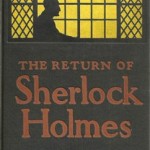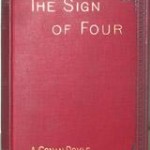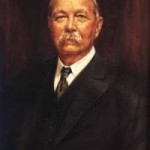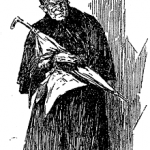“Yes.”
“Did he say so?”
“No.”
“The Duke, then?”
“Good heaven, no!”
“Then how could you know?”
“I have had some confidential talks with Mr. James Wilder, his Grace’s secretary. It was he who gave me the information about Lord Saltire’s feelings.”
“I see. By the way, that last letter of the Dukes—was it found in the boy’s room after he was gone?”
“No, he had taken it with him. I think, Mr. Holmes, it is time that we were leaving for Euston.”
“I will order a four-wheeler. In a quarter of an hour, we shall be at your service. If you are telegraphing home, Mr. Huxtable, it would be well to allow the people in your neighbourhood to imagine that the inquiry is still going on in Liverpool, or wherever else that red herring led your pack. In the meantime I will do a little quiet work at your own doors, and perhaps the scent is not so cold but that two old hounds like Watson and myself may get a sniff of it.”
That evening found us in the cold, bracing atmosphere of the Peak country, in which Dr. Huxtable’s famous school is situated. It was already dark when we reached it. A card was lying on the hall table, and the butler whispered something to his master, who turned to us with agitation in every heavy feature.
“The Duke is here,” said he. “The Duke and Mr. Wilder are in the study. Come, gentlemen, and I will introduce you.”
I was, of course, familiar with the pictures of the famous statesman, but the man himself was very different from his representation. He was a tall and stately person, scrupulously dressed, with a drawn, thin face, and a nose which was grotesquely curved and long. His complexion was of a dead pallor, which was more startling by contrast with a long, dwindling beard of vivid red, which flowed down over his white waistcoat with his watch-chain gleaming through its fringe. Such was the stately presence who looked stonily at us from the centre of Dr. Huxtable’s hearthrug. Beside him stood a very young man, whom I understood to be Wilder, the private secretary. He was small, nervous, alert with intelligent light-blue eyes and mobile features. It was he who at once, in an incisive and positive tone, opened the conversation.
“I called this morning, Dr. Huxtable, too late to prevent you from starting for London. I learned that your object was to invite Mr. Sherlock Holmes to undertake the conduct of this case. His Grace is surprised, Dr. Huxtable, that you should have taken such a step without consulting him.”
“When I learned that the police had failed——”
“His Grace is by no means convinced that the police have failed.”
“But surely, Mr. Wilder——”
“You are well aware, Dr. Huxtable, that his Grace is particularly anxious to avoid all public scandal. He prefers to take as few people as possible into his confidence.”
“The matter can be easily remedied,” said the brow-beaten doctor; “Mr. Sherlock Holmes can return to London by the morning train.”
“Hardly that, Doctor, hardly that,” said Holmes, in his blandest voice. “This northern air is invigorating and pleasant, so I propose to spend a few days upon your moors, and to occupy my mind as best I may. Whether I have the shelter of your roof or of the village inn is, of course, for you to decide.”
I could see that the unfortunate doctor was in the last stage of indecision, from which he was rescued by the deep, sonorous voice of the red-bearded Duke, which boomed out like a dinner-gong.
“I agree with Mr. Wilder, Dr. Huxtable, that you would have done wisely to consult me. But since Mr. Holmes has already been taken into your confidence, it would indeed be absurd that we should not avail ourselves of his services. Far from going to the inn, Mr. Holmes, I should be pleased if you would come and stay with me at Holdernesse Hall.”
“I thank your Grace. For the purposes of my investigation, I think that it would be wiser for me to remain at the scene of the mystery.”
“Just as you like, Mr. Holmes. Any information which Mr. Wilder or I can give you is, of course, at your disposal.”
“It will probably be necessary for me to see you at the Hall,” said Holmes. “I would only ask you now, sir, whether you have formed any explanation in your own mind as to the mysterious disappearance of your son?”
“No sir I have not.”
“Excuse me if I allude to that which is painful to you, but I have no alternative. Do you think that the Duchess had anything to do with the matter?”
The great minister showed perceptible hesitation.
“I do not think so,” he said, at last.
“The other most obvious explanation is that the child has been kidnapped for the purpose of levying ransom. You have not had any demand of the sort?”
“No, sir.”
“One more question, your Grace. I understand that you wrote to your son upon the day when this incident occurred.”
“No, I wrote upon the day before.”
“Exactly. But he received it on that day?”
“Yes.”
“Was there anything in your letter which might have unbalanced him or induced him to take such a step?”
“No, sir, certainly not.”
“Did you post that letter yourself?”
The nobleman’s reply was interrupted by his secretary, who broke in with some heat.
“His Grace is not in the habit of posting letters himself,” said he. “This letter was laid with others upon the study table, and I myself put them in the post-bag.”
“You are sure this one was among them?”
“Yes, I observed it.”
“How many letters did your Grace write that day?”
“Twenty or thirty. I have a large correspondence. But surely this is somewhat irrelevant?”
“Not entirely,” said Holmes.
“For my own part,” the Duke continued, “I have advised the police to turn their attention to the south of France. I have already said that I do not believe that the Duchess would encourage so monstrous an action, but the lad had the most wrong-headed opinions, and it is possible that he may have fled to her, aided and abetted by this German. I think, Dr. Huxtable, that we will now return to the Hall.”
I could see that there were other questions which Holmes would have wished to put, but the nobleman’s abrupt manner showed that the interview was at an end. It was evident that to his intensely aristocratic nature this discussion of his intimate family affairs with a stranger was most abhorrent, and that he feared lest every fresh question would throw a fiercer light into the discreetly shadowed corners of his ducal history.
When the nobleman and his secretary had left, my friend flung himself at once with characteristic eagerness into the investigation.
The boy’s chamber was carefully examined, and yielded nothing save the absolute conviction that it was only through the window that he could have escaped. The German master’s room and effects gave no further clue. In his case a trailer of ivy had given way under his weight, and we saw by the light of a lantern the mark on the lawn where his heels had come down. That one dint in the short, green grass was the only material witness left of this inexplicable nocturnal flight.
Sherlock Holmes left the house alone, and only returned after eleven. He had obtained a large ordnance map of the neighbourhood, and this he brought into my room, where he laid it out on the bed, and, having balanced the lamp in the middle of it, he began to smoke over it, and occasionally to point out objects of interest with the reeking amber of his pipe.
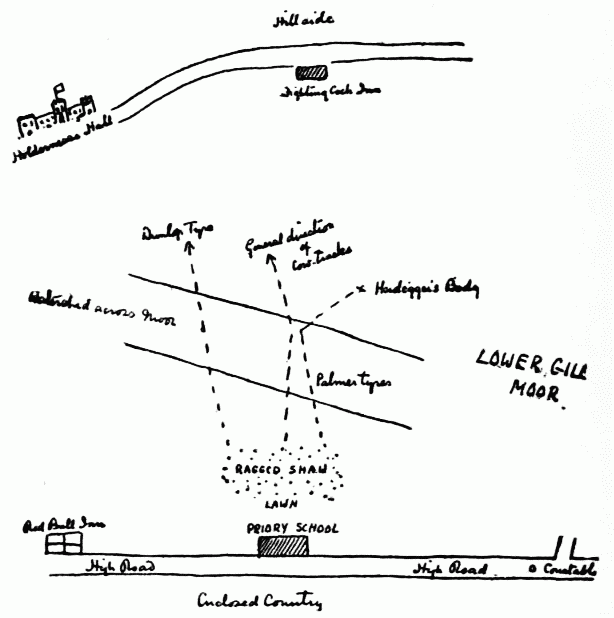
“This case grows upon me, Watson,” said he. “There are decidedly some points of interest in connection with it. In this early stage, I want you to realize those geographical features which may have a good deal to do with our investigation.
“Look at this map. This dark square is the Priory School. I’ll put a pin in it. Now, this line is the main road. You see that it runs east and west past the school, and you see also that there is no side road for a mile either way. If these two folk passed away by road, it was THIS road.”
“Exactly.”
“By a singular and happy chance, we are able to some extent to check what passed along this road during the night in question. At this point, where my pipe is now resting, a county constable was on duty from twelve to six. It is, as you perceive, the first cross-road on the east side. This man declares that he was not absent from his post for an instant, and he is positive that neither boy nor man could have gone that way unseen. I have spoken with this policeman to-night and he appears to me to be a perfectly reliable person. That blocks this end. We have now to deal with the other. There is an inn here, the Red Bull, the landlady of which was ill. She had sent to Mackleton for a doctor, but he did not arrive until morning, being absent at another case. The people at the inn were alert all night, awaiting his coming, and one or other of them seems to have continually had an eye upon the road. They declare that no one passed. If their evidence is good, then we are fortunate enough to be able to block the west, and also to be able to say that the fugitives did NOT use the road at all.”
“But the bicycle?” I objected.
“Quite so. We will come to the bicycle presently. To continue our reasoning: if these people did not go by the road, they must have traversed the country to the north of the house or to the south of the house. That is certain. Let us weigh the one against the other. On the south of the house is, as you perceive, a large district of arable land, cut up into small fields, with stone walls between them. There, I admit that a bicycle is impossible. We can dismiss the idea. We turn to the country on the north. Here there lies a grove of trees, marked as the ‘Ragged Shaw,’ and on the farther side stretches a great rolling moor, Lower Gill Moor, extending for ten miles and sloping gradually upward. Here, at one side of this wilderness, is Holdernesse Hall, ten miles by road, but only six across the moor. It is a peculiarly desolate plain. A few moor farmers have small holdings, where they rear sheep and cattle. Except these, the plover and the curlew are the only inhabitants until you come to the Chesterfield high road. There is a church there, you see, a few cottages, and an inn. Beyond that the hills become precipitous. Surely it is here to the north that our quest must lie.”
“But the bicycle?” I persisted.
“Well, well!” said Holmes, impatiently. “A good cyclist does not need a high road. The moor is intersected with paths, and the moon was at the full. Halloa! what is this?”
There was an agitated knock at the door, and an instant afterwards Dr. Huxtable was in the room. In his hand he held a blue cricket-cap with a white chevron on the peak.
“At last we have a clue!” he cried. “Thank heaven! at last we are on the dear boy’s track! It is his cap.”
“Where was it found?”
“In the van of the gipsies who camped on the moor. They left on Tuesday. To-day the police traced them down and examined their caravan. This was found.”
“How do they account for it?”
“They shuffled and lied—said that they found it on the moor on Tuesday morning. They know where he is, the rascals! Thank goodness, they are all safe under lock and key. Either the fear of the law or the Duke’s purse will certainly get out of them all that they know.”
“So far, so good,” said Holmes, when the doctor had at last left the room. “It at least bears out the theory that it is on the side of the Lower Gill Moor that we must hope for results. The police have really done nothing locally, save the arrest of these gipsies. Look here, Watson! There is a watercourse across the moor. You see it marked here in the map. In some parts it widens into a morass. This is particularly so in the region between Holdernesse Hall and the school. It is vain to look elsewhere for tracks in this dry weather, but at THAT point there is certainly a chance of some record being left. I will call you early to-morrow morning, and you and I will try if we can throw some little light upon the mystery.”
The day was just breaking when I woke to find the long, thin form of Holmes by my bedside. He was fully dressed, and had apparently already been out.
“I have done the lawn and the bicycle shed,” said he. “I have also had a rumble through the Ragged Shaw. Now, Watson, there is cocoa ready in the next room. I must beg you to hurry, for we have a great day before us.”
His eyes shone, and his cheek was flushed with the exhilaration of the master workman who sees his work lie ready before him. A very different Holmes, this active, alert man, from the introspective and pallid dreamer of Baker Street. I felt, as I looked upon that supple figure, alive with nervous energy, that it was indeed a strenuous day that awaited us.
And yet it opened in the blackest disappointment. With high hopes we struck across the peaty, russet moor, intersected with a thousand sheep paths, until we came to the broad, light-green belt which marked the morass between us and Holdernesse. Certainly, if the lad had gone homeward, he must have passed this, and he could not pass it without leaving his traces. But no sign of him or the German could be seen. With a darkening face my friend strode along the margin, eagerly observant of every muddy stain upon the mossy surface. Sheep-marks there were in profusion, and at one place, some miles down, cows had left their tracks. Nothing more.
“Check number one,” said Holmes, looking gloomily over the rolling expanse of the moor. “There is another morass down yonder, and a narrow neck between. Halloa! halloa! halloa! what have we here?”
We had come on a small black ribbon of pathway. In the middle of it, clearly marked on the sodden soil, was the track of a bicycle.
“Hurrah!” I cried. “We have it.”
But Holmes was shaking his head, and his face was puzzled and expectant rather than joyous.
“A bicycle, certainly, but not THE bicycle,” said he. “I am familiar with forty-two different impressions left by tires. This, as you perceive, is a Dunlop, with a patch upon the outer cover. Heidegger’s tires were Palmer’s, leaving longitudinal stripes. Aveling, the mathematical master, was sure upon the point. Therefore, it is not Heidegger’s track.”
“The boy’s, then?”
“Possibly, if we could prove a bicycle to have been in his possession. But this we have utterly failed to do. This track, as you perceive, was made by a rider who was going from the direction of the school.”
“Or towards it?”
“No, no, my dear Watson. The more deeply sunk impression is, of course, the hind wheel, upon which the weight rests. You perceive several places where it has passed across and obliterated the more shallow mark of the front one. It was undoubtedly heading away from the school. It may or may not be connected with our inquiry, but we will follow it backwards before we go any farther.”
We did so, and at the end of a few hundred yards lost the tracks as we emerged from the boggy portion of the moor. Following the path backwards, we picked out another spot, where a spring trickled across it. Here, once again, was the mark of the bicycle, though nearly obliterated by the hoofs of cows. After that there was no sign, but the path ran right on into Ragged Shaw, the wood which backed on to the school. From this wood the cycle must have emerged. Holmes sat down on a boulder and rested his chin in his hands. I had smoked two cigarettes before he moved.

